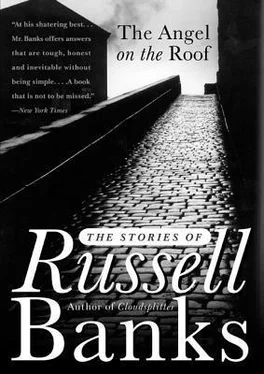I looked around me. Did no one else see what I saw? It seemed somehow grandiose to ask, but was I the only one here open to the meaning of this man’s expression? When he drew near, one or two people glanced up, then quickly resumed their previous activity, as if the madman were no more diverting than a stray dog wandering into the café. Everyone else simply treated him as if he weren’t there at all or, if there, as if his presence weren’t worthy of comment. This time, Djinn did not come to my table, nor did he lock eyes with me. Instead, he ignored me altogether, and, to my surprise, I found myself disappointed by it and, in a childlike way, saddened. What was wrong with me? I wondered, and simultaneously wondered how I might regain his attention. I could wave my hand, perhaps, or call out to him, notions I dropped at once, for it would have looked absurd to the others, a foreigner inviting contact with the madman, Djinn.
He passed within a few feet of my table — smelling of wet hay and overripe fruit, like a horse or other large domestic animal — but didn’t acknowledge me. Or anyone else, for that matter. He seemed on a mission, focused and directed, as he moved clumsily between the tables to the far side of the café, where suddenly he reached up and with one hand grabbed onto the support of a second-story balcony and pulled himself up to the first railing and climbed over it. Now he had everyone’s attention, no longer just mine. An odd silence came over the café, as everyone turned and stared at the madman, who was climbing up a rainspout from the second story to the third. He swung himself from the pipe out along a narrow ledge, then stood on the ledge and inched his way along it to a place from which he could reach a wrought-iron window balcony. Turning his broad back to the crowd below, in the process casually exposing his buttocks to us, he grabbed the balcony and pulled himself up to the shuttered window, turned, and faced us like a pope.
At the edge of my awareness, while the madman was climbing the side of the building, I had half-observed a bulky man with a handlebar mustache get up from his crowded table and step alone to the spot where Djinn had begun his climb. The man wore the dark blue guayabera shirt that I had learned to associate with members of the plainclothes police force, and when he slipped his right hand under his shirt, I knew that he was reaching for a gun. In a second, he had it out and aimed at Djinn, who was almost directly overhead, three stories up. Now everyone’s attention was on the policeman’s nickel-plated gun, not the man at whom it was aimed.
“All right, Djinn,” the policeman said in a harsh, but utterly relaxed voice. “Come down now. You know the rules.”
I looked for Djinn’s reaction, hoping against hope that he would immediately descend. I nearly called out to him myself. But I couldn’t. His face was still lit by a knowledge or emotion or memory that was more powerful and clarifying than anything we here below had ever experienced. He looked like a man to whom everything had at last been elucidated. There was something new there, however, something that he seemed to have obtained only in the last few moments, or possibly obtained only from his perspective on high.
This must be the true face of love , I thought, and in that instant felt myself transformed, not into a beloved object — which, when viewed by a lover, would more normally be the case — but into a beloved subject . Which is dramatically, even metaphysically, different. Djinn’s large brown eyes gazed down on all of us with a compassion and humor that could not help but make us feel truly beloved — most of us for the first time in our lives. I know that I was not alone in this. Many of the people around me had left their chairs just as I had and were staring up at Djinn, wide-eyed and slack-mouthed, struck dumb with awe and inexplicable gratitude.
“Come on down now, Djinn, or I’ll have to shoot you! Last chance!”
Djinn climbed to the top rail of the balcony and balanced there momentarily, then nonchalantly reached above his head and grabbed onto the clay tiles of the roof with both hands. He swung free of the balcony, caught the top ledge of the French window with his toes, and hefted himself toward the roofs, when the policeman fired, once, then a second time, the bullets jarring Djinn as they hit him in the middle of his back. For a second he clung there, unmoving, as if he might have actually absorbed the bullets into his body and rendered them harmless. But, no, he let go of the roof tiles, his toes slipped off the window ledge, and he tumbled backwards, off the building, down to the cobblestone street, where his body slammed against the stones with bone-breaking force. We heard the bones break and the flesh rip and tear like rotted cloth. All of us. Not just me. And yet not one of us, not even me, acted as though anything untoward had happened. The policeman walked slowly back to his table, and the others returned to their seats, and everyone seemed to pick up eating, drinking, and talking where he had left off.
Andrew, looking sour and impatient, hurried from his kitchen with two teenage helpers in tow, dishwashers or busboys, and the three of them swiftly lifted the body of the madman and dragged it up the street, disappearing with it around the corner at the square. I watched, aghast, bewildered, astonished. What had happened? When, a few moments later, the barman returned, he stopped next to my table and untied his bloodstained apron with evident irritation. He started to move on, and I grabbed his arm. “Where did you take him?” I asked.
“Who?”
“The madman! Djinn!”
“Oh. To the police station,” he said, and headed toward the bar, where customers were awaiting his return. Over his shoulder, as an afterthought, he called to me, “The police will take care of the body, sir. Don’t you worry yourself.”
I sat a long time, stunned and very confused by what I had seen. Finally, I paid and left the café, hoping that I had at least partially imagined what I had seen tonight. Or maybe I had imagined all of it. That would be even better.
I wanted to be alone and to sleep. I very much wanted to sleep.
The following day, I arrived early at the Industrial Park, distracted and cross. From the start of the day to its end, I couldn’t seem to cope with the usual difficulties of training the natives. I could not accept those difficulties as being natural and legitimate. This was not like me. I was trying to teach them to operate the German-made lathes that turned the heels of our sandals out of mahogany that we imported at great expense from the Cambodian highlands, milled in Goa, and transshipped here to Katonga. For hundreds of thousands of years, these people, our Katongan employees, had been equatorial rain-forest hunters and subsistence farmers, and I probably should not have expected them to adapt as quickly as nineteenth-century New Englanders to working with industrial machinery, day in and day out, year in and year out, on assembly lines manufacturing products that they themselves would never use or even see used by others. Ordinarily, I understood the obstacles they faced and, without prejudice, scaled my expectations accordingly. But today, for some reason, I was baffled by their ineptitude and inattention and consequently found myself screaming at them for the slightest offense or oversight. By midafternoon, whenever I approached the line, the workers looked down or away, and when I retreated to the office, the clerks and managers started shuffling through their files as if searching for a lost letter. Finally, I gave it up and called for my driver and returned to town.
I asked to be let off at Binga Park, and walked straightaway to the café at the end of the cul-de-sac near my hotel. When I reached the corner of the narrow street, and from the square peered down its length to the deserted café and bar at the end, where Andrew calmly washed yesterday’s mud and Djinn’s blood off the cobblestones of the courtyard that surrounded his tables, something turned me away — a felt , rather than heard or seen, warning was issued to me. This place is terribly cold, I thought. Quickly, I walked on and went directly to my hotel room, where I poured myself a tumbler of whiskey and sat by the window, looked out on the park, and waited for dark.
Читать дальше












